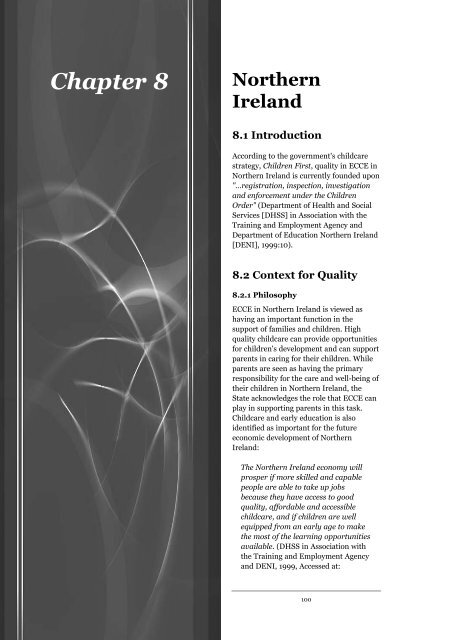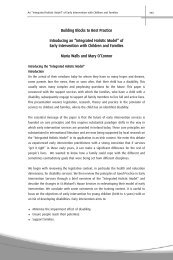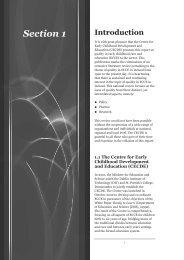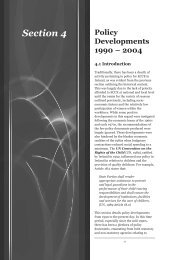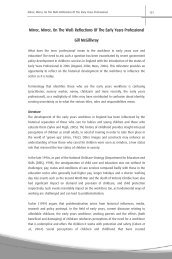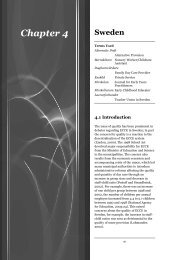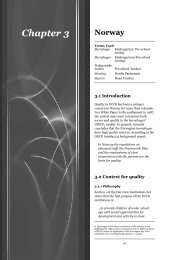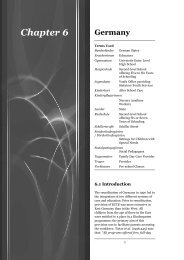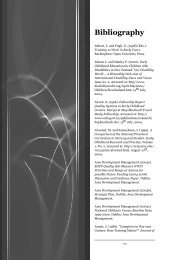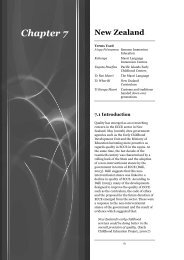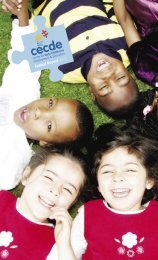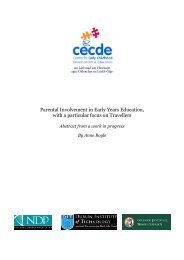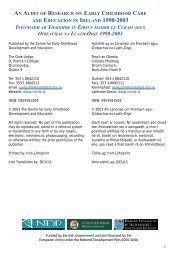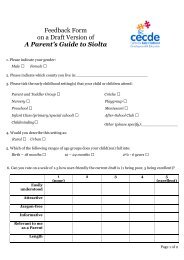Northern Ireland - Centre for Early Childhood Development ...
Northern Ireland - Centre for Early Childhood Development ...
Northern Ireland - Centre for Early Childhood Development ...
You also want an ePaper? Increase the reach of your titles
YUMPU automatically turns print PDFs into web optimized ePapers that Google loves.
Chapter 8<strong>Northern</strong><strong>Ireland</strong>8.1 IntroductionAccording to the government's childcarestrategy, Children First, quality in ECCE in<strong>Northern</strong> <strong>Ireland</strong> is currently founded upon"…registration, inspection, investigationand en<strong>for</strong>cement under the ChildrenOrder" (Department of Health and SocialServices [DHSS] in Association with theTraining and Employment Agency andDepartment of Education <strong>Northern</strong> <strong>Ireland</strong>[DENI], 1999:10).8.2 Context <strong>for</strong> Quality8.2.1 PhilosophyECCE in <strong>Northern</strong> <strong>Ireland</strong> is viewed ashaving an important function in thesupport of families and children. Highquality childcare can provide opportunities<strong>for</strong> children's development and can supportparents in caring <strong>for</strong> their children. Whileparents are seen as having the primaryresponsibility <strong>for</strong> the care and well-being oftheir children in <strong>Northern</strong> <strong>Ireland</strong>, theState acknowledges the role that ECCE canplay in supporting parents in this task.Childcare and early education is alsoidentified as important <strong>for</strong> the futureeconomic development of <strong>Northern</strong><strong>Ireland</strong>:The <strong>Northern</strong> <strong>Ireland</strong> economy willprosper if more skilled and capablepeople are able to take up jobsbecause they have access to goodquality, af<strong>for</strong>dable and accessiblechildcare, and if children are wellequipped from an early age to makethe most of the learning opportunitiesavailable. (DHSS in Association withthe Training and Employment Agencyand DENI, 1999, Accessed at:100
Chapter 8<strong>Northern</strong> <strong>Ireland</strong>http://www.dhsspsni.gov.uk/publications/archived/childrenfirst.asp, 1st July, 2004).ECCE in <strong>Northern</strong> <strong>Ireland</strong> is there<strong>for</strong>e seenas having three main functions; thepromotion of the well-being of children, theprovision of equal opportunities to parentsand the provision of supports to parents inbalancing work and family life.8.2.2 PolicyResponsibility <strong>for</strong> ECCE is divided betweenthe Department of Education and theDepartment of Health and Social Services(DHSS), in line with the division betweeneducation and care services in the UK(OECD, 2000b). Responsibility <strong>for</strong> preschooleducation lies with the Departmentof Education and responsibility <strong>for</strong> servicesproviding care <strong>for</strong> children lies with theDHSS. According to Children First (DHSSin Association with the Training andEmployment Agency and DENI, 1999), it isthe long-term goal of the government tointegrate the early education and careservices.Five Education and Library Boards in<strong>Northern</strong> <strong>Ireland</strong> are responsible <strong>for</strong>organising publicly-funded schooleducation within their area. Pre-schools areinspected by the Education and TrainingInspectorate. Under Children First, aChildcare Partnership was established ineach Health and Social Services Board in<strong>Northern</strong> <strong>Ireland</strong>, comprising of Voluntaryand Statutory Agencies with responsibility<strong>for</strong> implementing the government'schildcare strategy (<strong>Northern</strong> ChildcarePartnership, 2002). Health and SocialServices Trusts inspect services under theadministrative auspices of the DHSS.8.2.3 FundingThe main <strong>for</strong>m of subsidy <strong>for</strong> childcarecosts is demand funding (Candappa et al.,2003). For children aged from threemonths to three years, provision is largelyin the private and voluntary sectors, andparents pay fees. Pre-school education (<strong>for</strong>children aged from three to four) iscurrently being expanded and developed inco-operation with the private and voluntarysectors. The pre-school educationexpansion programme is working towardsprovision of a full year of pre-schooleducation <strong>for</strong> every child whose parentswant it in the year prior to entry to <strong>for</strong>malschooling.8.2.4 Delivery StrategiesMost childcare and early education in<strong>Northern</strong> <strong>Ireland</strong> is supplied by privateproviders. Compulsory primary educationstarts at the age of four and this is providedby the State.8.3 Defining Quality8.3.1 Children Order (1995)Under the Children Order (Her Majesty'sStationery Office [HMSO], 1995), Healthand Social Services Trusts are responsible<strong>for</strong> the registration and inspection of daycare services and childminding.Furthermore, they promote and encouragegood practice through the provision ofadvice and guidance to providers. Anychildcare facility or child minder providingcare <strong>for</strong> more than 2 hours in any one dayis required to be registered by law. SocialServices <strong>Early</strong> Years Teams assess theirsuitability in 3 key areas:Premises - <strong>for</strong> health and safety;Staff - via police, medical and socialservices checks to ensure individuals aresuitable to care <strong>for</strong> children;Equipment and play environment - toensure that it is age appropriate safe andstimulating. (Children's Services<strong>Northern</strong> <strong>Ireland</strong>, Accessed at: http://www.google.ie/search?q=cache:iyL7DHSVkc8J:www.childrensservicesnorthernireland.com/earlyyears/faq.asp+Social+S101
Chapter 8<strong>Northern</strong> <strong>Ireland</strong>ervices+<strong>Early</strong>+Years+Teams+assessment+premises+staff&hl=en&start=1, 15thMarch, 2004.)The DHSS offers guidance on the suitabilityof service providers, premises andequipment; adult/child ratios and thephysical environment in which care takesplace.8.3.2 Pre-school EducationExpansion ProgrammeThis programme provides funding toprivate and voluntary providers <strong>for</strong> theprovision of free pre-school places tochildren. The programme is committed toproviding quality pre-school education andas such includes regulations and aninspection process. All programmes have tomeet minimum quality standards to receivefunding:These standards relate to the natureof the pre-school curriculum, thenumber and duration of sessions, thenumber of children, the staff/childratios, the qualifications held by staff,the accommodation and the provisionof support from a qualified teacher orearly years specialist. (DENI, 2002:1)For example, all services participating inthe programme are required to secure theservices of a qualified teacher or an ECCEspecialist, who can in turn support staff inimplementing the education provision.8.3.3 CurriculumThe Curricular Guidance <strong>for</strong> Pre-schoolEducation is a process rather than anoutcomes-based curriculum. It recognisesthat children are entitled to a curriculumwhich enables them to make appropriateprogress, and that desired learning willcome from an appropriate curriculum. Thecurriculum focuses on describing the typeof activities to be experienced rather thanon outlining the evidence of learning orassessment to be applied.The <strong>Northern</strong> <strong>Ireland</strong> Curriculum sets outthe minimum educational entitlement <strong>for</strong>pupils aged four to sixteen years of age.There is a statutory requirement <strong>for</strong> theCurriculum to be delivered to all pupilsattending grant-aided schools.The curriculum is defined in terms of fourkey stages. Key Stage One covers the firstfour school years (pupils aged four-eightyears of age) and includes ReligiousEducation, English, Mathematics, Scienceand Technology, History and Geography(known as the Environment and SocietyArea of Study), Art and Design, Music andPhysical Education (known as the Creativeand Expressive Area of Study). In addition,there are educational themes to be woventhrough the main subjects of thecurriculum, including education <strong>for</strong> mutualunderstanding, cultural heritage, healtheducation and in<strong>for</strong>mation technology.Each subject in the <strong>Northern</strong> <strong>Ireland</strong>Curriculum is defined within theProgrammes of Study and AttainmentTargets. The Programmes of Study set outthe opportunities which should be offeredto all pupils, subject to their age and ability,in terms of the knowledge, skills andunderstanding at each key stage. Teachersuse the programmes of study as a basis <strong>for</strong>planning schemes of work. AttainmentTargets define the expected standards ofpupil per<strong>for</strong>mance in particular aspects of asubject and provide the basis <strong>for</strong> makingjudgements on pupils' attainment at theend of each key stage. The <strong>Northern</strong> <strong>Ireland</strong>Council <strong>for</strong> the Curriculum, Examinationsand Assessment (DHSS and DENI, 1997)are the statutory advisory bodiesresponsible <strong>for</strong> the curriculum.8.4 Measuring QualityThe Education and Training Inspectoratereports on the quality of funded pre-schoolprovision within the statutory, private andvoluntary sector. The inspection process102
Chapter 8<strong>Northern</strong> <strong>Ireland</strong>consists of an in<strong>for</strong>mal pre-school visit,followed by a <strong>for</strong>mal visit, which results ina published report. Where areas areidentified that require improvement, theservice is requested to draw up an actionplan, detailing the way in which they willwork to bring about the necessaryimprovements. The inspectorate monitorsthe implementation of these action plans.When shortcomings are found in key areas,a follow up inspection is carried out four tosix months after the initial <strong>for</strong>malinspection.commitment to collaborative workingbetween the Education and TrainingInspectorate and those responsible <strong>for</strong>registration and inspection under theChildren Order. In addition, it advocatesGood Practice Networks to provide modelsof quality integrated education andchildcare, a new training and qualificationsframework <strong>for</strong> childcare workers, moreopportunities to train as childcare workersand better support <strong>for</strong> parents and in<strong>for</strong>malcarers.8.5.2 Sure Start8.5 Supporting Quality8.5.1 Children FirstChildren First, the <strong>Northern</strong> <strong>Ireland</strong>Childcare Strategy recognizes theimportance of ECCE in supporting parentsand families (DHSS in Association with theTraining and Employment Agency andDENI, 1999). Children First identifiesseveral problems currently facing thechildcare sector in <strong>Northern</strong> <strong>Ireland</strong>.Quality is variable in ECCE services, thereis no consistent definition of whatconstitutes quality, which is recognized andapplied across all childcare settings. Onlyhalf of all childcare workers in <strong>Northern</strong><strong>Ireland</strong> have any relevant qualification.There are differences in regulation betweenthe education and care sectors. Theavailability of childcare is limited in someareas and is in many cases too expensive<strong>for</strong> parents to af<strong>for</strong>d. Parents' access tochildcare is also hampered by poorin<strong>for</strong>mation and the quality and accuracy ofin<strong>for</strong>mation on the availability of childcareis insufficient to allow parents makein<strong>for</strong>med decisions about the care of theirchildren.Children First proposes action in a numberof areas. First of all, it proposes action toaddress the quality of provision, includingthe establishment of new regional and localco-ordinating structures, better integrationof early education and childcare and aThe Sure Start initiative was established toprovide early intervention supports <strong>for</strong>disadvantaged families in an integratedfashion (Sure Start, Accessed at:http://www.surestart.gov.uk, 1st July,2004). Sure Start is a government initiativeto enhance services <strong>for</strong> children under fouryears of age and their families in areas ofgreatest need, through better access tofamily support, advice on parenting, healthservices and early learning. Each Sure Startproject is managed by a committee of localpartnerships including statutory, voluntaryand community groups and includes localparents in decision making. ChildcarePartnerships work with potential providersand identify priority areas <strong>for</strong> Sure StartProjects. Though the design and content ofSure Start programmes varies according tolocal needs, all programmes are expected toinclude a number of core servicesincluding:Outreach and home visiting;Support <strong>for</strong> families and parents;Support <strong>for</strong> good quality play, learningand childcare experiences <strong>for</strong> children;Primary and community health care;Support <strong>for</strong> children and parents withspecial needs (Accessed at: Sure Start,Accessed at: http://www.surestart.gov.uk, 1st July, 2004).Each Sure Start Programme also has a setof shared principles and is expected to:103
Chapter 8<strong>Northern</strong> <strong>Ireland</strong>Co-ordinate, streamline and add valueto existing services;Involve parents, grandparents and othercarers;Avoid stigma by ensuring that all localfamilies are able to use Sure Start;Ensure lasting support by linking SureStart to services <strong>for</strong> older children;Be culturally appropriate and sensitiveto particular needs;Promote the participation of all localfamilies in the design and working ofthe programme (Sure Start, Accessed at:http://www.surestart.gov.uk, 1st July,2004).8.5.3 AccreditationOne of the ways in which the quality ofservices provided can be improved isthrough the use of accreditation schemes(DHSS in Association with the Training andEmployment Agency and DENI, 1999:10).There are currently a variety ofaccreditation schemes available <strong>for</strong> ECCEproviders in <strong>Northern</strong> <strong>Ireland</strong>. Theseinclude PlayBoard's Quality AssuranceScheme 'Pathways to Excellence', theNIPPA (The <strong>Early</strong> Years Organisation)Quality Assurance Scheme and theHigh/Scope accreditation scheme.<strong>Northern</strong> <strong>Ireland</strong> Childminding Association(NICMA) provides quality assuranceschemes <strong>for</strong> childminders. Children Firststates that:The Inter-Departmental Group on<strong>Early</strong> Years will invite relevantchildcare organisations to worktogether with the group to developcommon standards <strong>for</strong> accreditationin <strong>Northern</strong> <strong>Ireland</strong>. (DHSS inAssociation with the Training andEmployment Agency and DENI,1999:11)8.5.4 Building Quality ChildcareThe New Opportunities Fund have recentlyopened a new grant scheme entitled"Building Quality Childcare." The schemeis to meet the capital costs of new premises,refurbishment and modernisation ofexisting services and mobile services. Thefunding relates predominantly to preschoolprovision.8.5.5 Teacher TrainingInitial training of school teachers generallyinvolves a four-year Bachelor of Educationdegree course, or a bachelor's degreefollowed by a one-year PostgraduateCertificate in Education. Staff in childcarefacilities are not required to holdqualifications, though services under thepre-school education expansionprogramme must have a qualified teacherinvolved to receive funding from theeducation authorities.There is a range of qualifications available<strong>for</strong> staff in childcare facilities. The followingsection outlines some of the occupationprofiles and qualifications <strong>for</strong> thoseworking in the ECCE services ashighlighted by the <strong>Northern</strong> ChildcarePartnership (2002).Nursery Nurses work in a supervisoryrole in a variety of settings such asnursery schools or classes and privateday nurseries. The <strong>Northern</strong> ChildcarePartnership recommends a specificqualification, such as a NationalVocational Qualification (NVQ) at Level3 <strong>for</strong> those employed as nursery nurses.Nursery Assistants tend to work in ajunior role in nursery schools or classesand private day nurseries. The <strong>Northern</strong>Childcare Partnership recommends aspecific qualification, such as NVQ atLevel 2 or equivalent <strong>for</strong> those employedas nursery assistants.Playgroup leaders work in eithercommunity or private pre-schoolsettings providing either full day care orsessional care. Playgroup leaderssupervise staff on a day-to-day basis,plan the programme of activities andreport to the playgroup committee,chairperson or proprietor (<strong>Northern</strong>104
Chapter 8<strong>Northern</strong> <strong>Ireland</strong>Childcare Partnership, 2002). The NVQat Level 3 in <strong>Early</strong> Years Care andEducation or equivalent is seen as themost appropriate qualification <strong>for</strong> thoseinvolved in this kind of work. PlaygroupAssistants work under the supervision ofthe playgroup leader. The NVQ Level 2in <strong>Early</strong> Years Care and Education orequivalent Level 2 qualifications areconsidered the most appropriate <strong>for</strong> thiswork.The Government is developing a national'climbing frame' of qualifications to helppeople enter, move and progress in thechildcare sector (DHSS in Association withthe Training and Employment Agency andDENI, 1999). This framework will map outequivalencies between different <strong>for</strong>ms oftraining and qualification and will lay outprogression routes <strong>for</strong> those involved in theECCE sector. Children First recommendedthat:T&EA [Training and EmploymentAgency] will develop a childcaretraining strategy <strong>for</strong> <strong>Northern</strong><strong>Ireland</strong>, in consultation with otherrelevant Departments and otherstakeholders including employers inthe sector and the National TrainingOrganisations, and will aim to ensurethat the resources available are usedas efficiently and effectively aspossible. (DHSS in Association withthe Training and Employment Agencyand DENI, 1999:13)8.5.6 ChildmindersConsiderable emphasis is placed ontraining <strong>for</strong> childminders, as a way ofenhancing quality (<strong>Northern</strong> AreaPartnership, 2002) and many childmindersundertake an introductory course be<strong>for</strong>ethey begin childminding.8.5.7 Childcare PartnershipsUnder Children First, four ChildcarePartnerships were established, one <strong>for</strong> eachHealth and Social Services Board in<strong>Northern</strong> <strong>Ireland</strong>. These ChildcarePartnerships are partnerships of Voluntaryand Statutory Agencies whose remit is theimplementation of the Government'sChildcare Strategy, Children First. ThePartnerships provide a range of servicesdesigned to support quality; <strong>for</strong> example,the Southern Partnership has engaged inactivities such as the production of a guideto quality in ECCE services, theidentification of training needs and the coordinationof training provision (SouthernArea Childcare Partnership, 2002).8.5.8 Childminding NetworksA Children Come First childmindingnetwork is an approved <strong>for</strong>mal group ofbetween twenty and thirty registeredchildminders recruited, assessed andmonitored by a network co-ordinator, whoensures that they maintain the standards ofNICMA's Quality Childminding Charter.Settings are monitored on a 12 weeklycycle.8.5.9 Innovative ProjectsThere are some projects which seek todevelop the quality of services provided onan ongoing basis in <strong>Northern</strong> <strong>Ireland</strong>. Anumber of ECCE providers areparticipating in the EEL approach toquality assessment and improvement.NIPPA has implemented a pilot project onthe Reggio Emilia Approach, which hasinvolved 20 <strong>Early</strong> Years groups, working onestablishing this innovative approach toECCE in their facilities.8.6 EducationalDisadvantage and SpecialNeedsNICMA have a dedicated ChildmindingNetwork <strong>for</strong> families of children who mayhave a disability or special need. This105
Chapter 8<strong>Northern</strong> <strong>Ireland</strong>network can provide specially trainedchildminders who can be matched to achild's very specific needs.Children with special educational needs areeducated within mainstream schoolswherever possible. If a child needs morehelp than can reasonably be provided bythe resources normally available to theschool, the local authority must issue astatement of special educational needs,detailing the needs and the necessary extraprovision. In 2000-2001, around three percent of all pupils had a statement of specialeducational needs and around one per centof all pupils were educated in specialschools.In 2000-2001, the <strong>Northern</strong> Area ChildcarePartnership ran a grant scheme to supportthe inclusion of children with disabilitiesand from ethnic minorities in differenttypes of childcare provision (<strong>Northern</strong> AreaPartnership, 2002).8.7 Implications <strong>for</strong><strong>Ireland</strong>8.7.1 Co-ordinationResponsibility <strong>for</strong> ECCE is divided betweentwo government departments in line withthe division in <strong>Northern</strong> <strong>Ireland</strong> betweencare and education services.8.7.2 RegulationIn <strong>Northern</strong> <strong>Ireland</strong> legislation sets downminimum standards regarding structuralaspects of quality such as premises, staffand equipment.8.7.3 CurriculumThe value of a curriculum in supportingquality in ECCE is recognised in <strong>Northern</strong><strong>Ireland</strong>. The Curricular Guidance <strong>for</strong> PreschoolEducation is a process basedcurriculum. It focuses on describing thetype of activities to be experienced by preschoolchildren. The <strong>Northern</strong> <strong>Ireland</strong>Curriculum sets out the minimumeducational entitlement <strong>for</strong> pupils agedfour to sixteen years of age.8.7.4 InspectionThe Education and Training Inspectoratereports on the quality of funded pre-schoolprovision within the statutory, private andvoluntary sector. The inspection processconsists of an in<strong>for</strong>mal pre-school visit,followed by a <strong>for</strong>mal visit, which results ina published report8.7.5 Supporting QualityChildcare Partnerships were established,one <strong>for</strong> each Health and Social ServicesBoard in <strong>Northern</strong> <strong>Ireland</strong>. Partnershipshave a focus on supporting and improvingquality. Activities undertaken by thepartnerships include the production of aguide to quality in ECCE services, theidentification of training needs and the coordinationof training provision.8.7.6 Special Needs and DisadvantageChildren with special educational needs areeducated within mainstream schoolswherever possible. If a child needs morehelp than can reasonably be provided bythe resources normally available to theschool, the local authority must issue astatement of special educational needs,detailing the needs and the necessary extraprovision. The Sure Start initiative wasestablished to provide early interventionsupports <strong>for</strong> disadvantaged families in anintegrated fashion.8.7.7 ConclusionIn conclusion, on the strength of theevidence collected from <strong>Northern</strong> <strong>Ireland</strong>, anumber of features of quality can be106
Chapter 8<strong>Northern</strong> <strong>Ireland</strong>identified which are worth considering inthe development of a quality framework <strong>for</strong><strong>Ireland</strong>:While there is currently a divisionbetween education and care in <strong>Northern</strong><strong>Ireland</strong>, it is an aim of governmentpolicy that co-ordination at all levelsbetween services providing care andeducation be improved.Curriculum guidelines are used in<strong>Northern</strong> <strong>Ireland</strong> as a mechanismdetermining quality in pre-schools andthere is a curriculum in place <strong>for</strong> allschool children.There are several accreditation schemesoffered by voluntary childcareorganisations in <strong>Northern</strong> <strong>Ireland</strong>.Childcare Partnerships have beenestablished to support and improvequality at local level, these Partnershipswill focus on issues such as theprovision of in<strong>for</strong>mation and training.The principle of inclusion inmainstream education <strong>for</strong> children withspecial needs is adopted in <strong>Northern</strong><strong>Ireland</strong>.107


